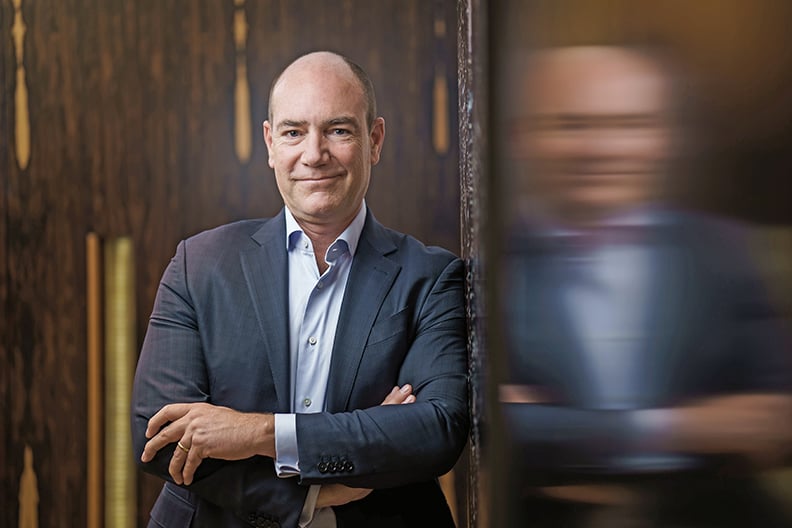“Innovation is not enough.”: Paul Cuatrecasas
Trying to become the best company is no longer enough, says the Founder and CEO of Aquaa Partners, Paul Cuatrecasas. To survive in a world of technology, traditional companies need to become tech brands through increasing innovation.
Sitting in his London office, surrounded by books on business, economics and history, the Founder and CEO of Aquaa Partners, Paul Cuatrecasas, describes the type of scenario that inspired him to become an author. "Let’s say you’re a food processor company in Europe with a brand that’s been around for 100 years," he begins.

"You’ve done well, amassed a strong market share and created a great product. But now you’re facing pressure from lots of angles across the value chain. There are new products coming out all the time that brand themselves as healthy, sustainable, no plastic, great taste, no sugar, no additives and so on.
It’s easier than ever for new players to do marketing and sales, to go direct to the consumer. It doesn’t cost a lot for your customer to switch from your brand to the competition.
"All of a sudden, your brand, which has been loved by millions of people for years and years, no longer receives much love or many sales. People are choosing this other brand, which they see as healthier, more sustainable and better for their kids.
"On top of all this, the other brand has equipped its supply chain management system with machine learning software, so it’s more efficient and faster than you. You can’t get products out of your warehouse as quickly or as cheaply as other companies. Your margins take a hit, which deepens as you watch your competitors forge exclusive partnerships with self-driving cargo companies and start using drones for deliveries. What are you supposed to do?"
It is a scenario Paul has witnessed dozens of times, and one he expects to become more common over the next five years, as growth among tech companies continues to outpace that of non-tech companies.
It also serves as an analogy for the circumstances that have driven numerous major international companies to bankruptcy in recent memory, like Blockbuster, Kodak and JCPenney.
Witnessing the experiences of these companies, as well as those of companies that pivoted early enough to survive, are what drove Paul to spend two years of his life writing his recent book Go Tech, or Go Extinct (Berkeley Street Press, 2019).
"The book captures the impact of the exponential speed at which technology is impacting traditional companies, their value chains, stakeholders, customer behaviour – their entire ecosystem," Paul says.
"It impacts employees, who more and more often have to decide whether they want to stay at a traditional company that appears to be stagnating or take their talents to the next potential unicorn." His prescription for these companies is an investment strategy he has called Techquisition™ – the science of tech company acquisition.

"Innovation is not enough – of course every company has to innovate," he says. "You need to look beyond what you can do in-house and invest in other companies – tech companies and digital companies that are right for you strategically – and probably acquire them."
The origin of techquisition
No event better illustrates Paul’s thesis than Walmart’s 2016 acquisition of Jet.com – an ecommerce site that had existed for less than two years – for about €2.8 billion. "I was blown away. I literally fell out of my chair. I just couldn’t believe it when I learned the multiple they were paying," he recalls.
The world is changing at light speed right now. Companies that do not have the right armour, the right ammunition – companies that cannot assert their relevance – will disappear.
That shock soon gave way to curiosity. Why would Walmart’s executive committee, CEO and board of directors, all agree that this was a fair price for a company that was losing money. Paul began to deduce lessons from Walmart’s paradoxical decision.
"Walmart did its homework. They wanted to know what they needed to do to get Walmart.com to be competitive not just with Amazon but also other players on the rise. They figured that if they could not become the best on their own, they had better go out and buy the best, and they ended up acquiring one of the best ecommerce management teams in the world," he says.
In the year after Walmart’s Jet.com acquisition, the company’s value rose by about €50.8 billion, and it went on to replicate its success by purchasing a majority stake in Indian ecommerce site Flipkart for about €13.5 billion in 2018.
The Science of Tech Acquisition
Aquaa Partners is a London-based mergers and acquisitions and strategic advisory firm that advises established companies on managing transformation to create exponentially increasing market value. The firm has developed the proprietary Techquisition method – the "Science of Tech Company Acquisition". The firm was founded in 2010 by Paul Cuatrecasas, who had previously founded Alegro Capital in 2003 and co-founded ARC Associates in 1993. Aquaa Partners helps growth-focused companies create more value, guard against disruption and enhance the customer experience by acquiring the right tech company. The firm advises clients on using and leveraging the 12 steps of Techquisition to create and retain maximum value from a tech company acquisition.
That same year, Paul was wrapping up a series of meetings with C-suite executives from 350 companies that were interested in Techquisition. Those conversations provided much of the data that Paul whittled down to the 12-step Techquisition methodology that his book refers to.
The main barrier he hopes readers will overcome while reading Go Tech, or Go Extinct is the false belief that acquiring a tech company is not feasible for most traditional companies.
"I heard constantly in my interviews with executives: ‘We can’t do that. We’re not Google or Amazon. What do we know about tech? The prices are so high. The people will leave us,’" Paul recalls.
"These are limiting beliefs and self-fulfilling prophecies. The difficult thing is making the decision." Paul’s observations have assured him that tech company acquisitions are by far more rewarding than any other kind of investment an established business could make.
Workers want to stay at companies where they can see that management is forward-thinking, not shackled by decades of technophobic beliefs, and run by people who know that the next 10 years will not be the same as the last 10 years.
"There’s business-as-usual and there’s business-asexponential. We are living in a business-as-exponential world," he says. "The world is changing at light speed right now. Companies that do not have the right armour, the right ammunition – companies that cannot assert their relevance – will disappear."
As CEO of Aquaa Partners, Paul and his team not only preach the gospel of Techquisition, they also help companies identify tech startups with whom they can forge mutually beneficial partnerships.
"The first step is searching for tech companies with our clients’ particular needs in mind. We end up with a list of 10,000–20,000 companies, which we narrow down to 100, then 50 or 10, then five – and these five are companies we’ve already thoroughly vetted and got to know their founders, and we understand who they are, what they want in life and in their relationships and what they want to achieve," he says.
"Once we understand that, we share our findings with our client. Then we ask ourselves, ‘Are we going to create a win–win marriage? Can we create a situation where one plus one equals three?’"
These deals, when successful, open up whole new worlds for the acquired tech company. They are injected with channels to market and commercial know-how they would not have had otherwise, and they benefit from the geographical reach and human resources of the company that bought them. Their products accelerate into the world.
"When entrepreneurs set up a company, they typically just want to change the world," Paul says. "They don’t set to be out to be billionaires. That doesn’t really have anything to do with it; the money will come anyway. They want to make an impact. Techquisition helps allow them to do that."